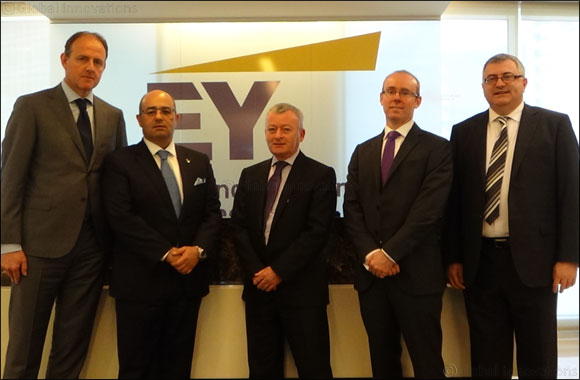
Global tax trends may impact Qatar's tax framework: EY
- OECD recommendations to change tax landscape in the region
Doha, January 24, 2016: EY today is hosting a seminar on changes to the tax and regulatory environment in Qatar, highlighting that taxation is likely to become a more prominent business concern across the Middle East. While low corporate tax rates will probably remain, value-added tax (VAT) seems likely to be introduced within the next few years. International developments also seem likely to influence the future direction for Qatar tax.
Finbarr Sexton, MENA Indirect Tax Leader, EY, says:
“Traditionally, tax has been a fairly low-key consideration for investors in the Middle East. Corporate tax rates are low, if tax is imposed at all. Expatriate labor is subject to neither tax nor social security and investors have paid limited regard to establishing efficient tax structures. If taxes have resulted, the rates have been low and have not had a large impact. Compared to other parts of the world, the Middle East has been a tax paradise. However it now seems clear that there will be some developments that make tax a more topical agenda in the Middle East.”
Global tax trends affecting the Middle East
Some of the larger tax challenges investors may face in the Middle East derive not from local developments but the way that tax is evolving internationally. In the 1990s, the Organisation for Economic Cooperation and Development (OECD) initiated a project on harmful tax competition. Ultimately, the OECD has recognized that there is nothing inherently wrong if a country decides to adopt a low-tax framework. However, the 15 recommendations that the OECD made in its Base Erosion and Profit Shifting (BEPS) reports last year are expected to change the taxation landscape.
Marcel Kerkvliet, International Tax Partner, EY Qatar, says:
“The Qatar Ministry of Finance is expected to adopt at least some of the OECD recommendations directly. This will affect future information reporting in Qatar, if not the way that taxable income is determined. However, even if none of the BEPS recommendations are adopted, other countries are likely to expect their investors to be more accountable for the amount of profits they are reporting in Qatar.”
Paul Karamanoukian, Tax Partner, EY Qatar, says:
“For multinationals, tax is no longer a game of just complying with regulations set by each local tax administration; investors need a global focus. If a subsidiary reports a high level of net profit in Qatar, for example, the local tax authorities would likely not raise any concerns. But once country-by-country reporting occurs in other jurisdictions, a tax official in another country might look at that profit level and ask whether that means that the group member in his country is underpaying tax as a result. It will become much more important to ensure that financial results can be demonstrated to align with the realities of each group member’s operations.”
The underlying principles of international tax are not changing. Taxable profits should still follow the place where key functions, assets and risks are located. What is changing is the attention that tax administrations globally will place on the question of whether the key functions, assets and risks are really located in the places that taxpayers say they are. This should not change the burden of tax. However, it could increase compliance costs and tax risks significantly.
“We are in a period where we need to wait and see exactly how tax authorities globally will deal with the OECD’s recommendations. The OECD has no influence over individual governments, so we will see a lot of different responses. What investors should be looking for is opportunities. With the likely changes on the horizon, now would be a good time to review corporate structures for tax efficiency, to see whether tax treaties are being utilized effectively and the supply chain will work well if VAT is introduced. A 5% rate may not sound like a lot, but if it ends up as an additional cost on purchases because a VAT structure is inefficient, it’s going to hurt much more than a 10% tax on net income,” comments Finbarr.
“The developments will also pose challenges to tax administration. Tax authorities may need further resources and training to deal with ever more complex taxation rules and a growing taxpayer population. Taxpayers also expect tax assessments to be finalized quicker and greater certainty about how tax rules are interpreted by assessors. It is important that tax authorities in the region find a way to address these challenges,” concludes Finbarr.
Share
Home >> Business and Economy Section
Islamic Treasury Sukuk Auction for June 2025 Attracts Bids Worth AED 6.21 Billion
Jeddah e-prix double-header becomes most-watched formula e weekend in history, data analysis shows
Statement from Wizz Air Abu Dhabi
du and China Mobile International explore 5G Advanced connectivity for metro projects
Taiwan Excellence Launches Innovative “Go Healthy with Taiwan” Campaign in the GCC
Ready for Summer: Chery UAE Offers Free Fuel Upon Purchase
Dubai Culture Unveils Heritage-Led Activation for Al Fahidi Historical Neighbourhood
Dubai Summer Surprises 2025 Brings Indoor Fun Runs for Everyone to Dubai's Iconic Malls
Emirati Treasures Tell the Story of a Nation at Mohammed Bin Rashid Library
RTA Announces Service Hours on Holiday Marking New Hijri Year 1447
Emirates resumes regularly scheduled operations after minimal disruption on 23 June
Get Ready for Fabulous Summer Looks with BADgal BANG! Power Blue Mascara!
Don't be late to your gate – Emirates flags a busy week of departures ahead
